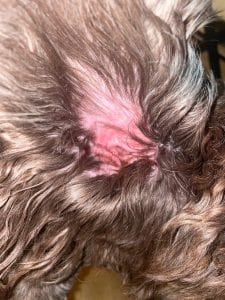Dogs can develop an allergy to certain ingredients in their food at any point in their lives. Around 10% of allergies in dogs are due to food. The most common signs of food allergies are itchy skin, ear infections, and stomach upsets such as vomiting and diarrhoea.
Food allergies are also called cutaneous adverse food reactions or food hypersensitivity. They cannot be cured but can be managed well, and dogs can live a full, happy life. Some dogs may need medication to help with severe flare-ups, but most can be managed with a special diet alone.
Overview
What are food allergies in dogs?
In general, the cause of these allergies is an abnormal immune reaction to a food or ingredient that your dog has already been exposed to.
- Any ingredient can cause a reaction but the most common is the protein source (i.e. chicken, dairy, beef)
- Your dog can be allergic to one or more ingredients in their food
- A food allergy involves the immune system, whereas a food intolerance does not
- Food allergies can occur at any age, even if they have been on the same food for years
- Once the allergy has developed, it cannot be cured but can be managed to stop or reduce the symptoms
Food allergies can cause severe symptoms. If you suspect your dog has any allergies, speak to a vet for advice and to form a treatment plan to help improve their health. Our Joii team are available 24 hours a day for advice.
Symptoms
Symptoms of food allergies in dogs
It’s not always easy to tell if your dog has food allergies. The signs might not be seen daily, can be vague, and are often linked to other allergies.
Signs include
- Itchy skin and paws
- Hair loss, red skin and rashes
- Itchy Ears and ear infections
- Vomiting, soft stools or Diarrhoea
- Weight loss
- Lethargy
- Flatulence


Find out more about what else can make your dog itchy
Risk
Are some dogs more at risk of food allergies than others?
Food allergies can affect dogs of all ages, breeds, and sexes. The following may be more at risk
- Breeds: Labradors, West Highland White Terriers, French Bulldogs, Cocker Spaniels, and Irish Setters
- Age: It can occur at any age, but is more common when they are between 6 months and 3 years old
Is my family at risk of catching food allergies?
Food allergies in dogs do not spread between dogs or from dogs to humans.
Diagnosis
How are food allergies diagnosed in dogs?
The diagnosis of food allergies can be tricky. Dogs may have other illnesses that are linked, such as environmental allergies (atopy) or Flea allergy.
The following tests can help rule out other conditions
- A thorough physical examination
- Skin scrapes, hair plucks and skin biopsy
- Blood and urine tests
- Intradermal allergy testing
- Imaging of the abdomen, such as x-rays or an ultrasound
- Stool tests
Elimination diet trials
An elimination diet trial is used to help diagnose food allergies in dogs.
- A hydrolysed or novel protein diet is used for at least 6–8 weeks to assess the response. Hydrolysed diets are made from proteins that are broken down into small pieces to avoid any immune reaction. A novel protein diet is on that your dog has never been exposed to.
- No other food, including treats, supplements or chews, should be fed during the trial.
- If the symptoms resolve during the trial, it indicates a food allergy. A re-introduction challenge to their old food which causes the symptoms to return confirms the diagnosis.
- Partial improvement of the symptoms indicates that there is not only a food allergy but also a concurrent allergy to something else.
- At the end of the trial, a veterinarian can advise you on the best food to keep your dog on long-term.
Most foods that are used for food trials can be used long-term too. See our recommendations in the home remedies section for more information. https://www.joiipetcare.com/health-conditions/dog/food-allergies/#hometreatment
Vet treatment
Vet treatment for food allergies in dogs
Allergies in dogs can be very complex. A multimodal approach is often needed to treat allergies. This involves using different products, including special food, medications, and supplements, to help control the symptoms.
Initially, your dog may need
- Anti-itch medication, such as steroids, anti-histamines, Cytopoint, and Apoquel.
- Antibiotics for any skin, ear or gastrointestinal infections
- Parasite control for any fleas or mites
- Pain relief
Once under control, most dogs with only food allergies can be managed alone with a special diet.
If the condition is complicated or not responding to treatment, your vet might refer your dog to a skin specialist (Dermatologist).
Home treatment
How to look after a dog with food allergies at home
Feed your dog a complete and balanced diet in the long term, avoiding any known allergens, such as
- Hydrolysed protein diets contain proteins that are broken down into tiny pieces to avoid an immune reaction. Hills Prescription Diet z/d is a hydrolysed diet that is clinically proven to reduce symptoms from food allergies and is used for food trials and long-term.
- A novel protein diet contains proteins that your dog has never been exposed to. These are usually the lesser-used sources, such as venison, duck, and insect content. Hills Prescription Diet Derm Complete and d/d are both designed for dogs with food sensitivities. Hills Prescription Diet Derm Complete is the world’s first clinically proven diet that helps reduce symptoms of both food and environmental allergies.
- A home-made diet is also possible. Only under direct advice from a veterinary nutritionist, otherwise, it can be unbalanced and lead to deficiencies.
Clean their ears regularly
- Use a vet recommended ear cleaner every 7-10 days to keep the ears clean and prevent infection. Cleaning the ears too often can also create problems.
Skin supplements and special shampoos
- Supplements containing omega oils can help reduce itching and support the skin barrier.
- Special shampoos can protect and soothe irritated skin.
Probiotics for soft stools or diarrhoea
- Probiotics usually come in paste or granules and help soothe the digestive tract as well as replenish the natural bacteria.
If your dog is very itchy, a buster collar, pet medical suit, or boots can prevent self-trauma.
We recommend speaking to a vet before using any supplements or ear cleaners as not all dogs need these.
Our Joii vets are available 24 hours a day for advice.
Prevention
Tips on how to prevent food allergies in dogs
Unfortunately, it is not possible to prevent food allergies in dogs.
If your dog has any symptoms of itchy skin, ears, or stomach upset, speak to a vet as soon as possible to find and treat the cause.
When to worry
When you should be worried about food allergies in dogs
Seek help from a vet if
- Your dog is constantly itchy
- Your dog has severe vomiting and diarrhoea, especially if there is blood
- Your dog is lethargic and losing weight
Call us and speak to one of our Joii vets if
- You want to do a diet trial for your dog
- You have any questions about your dog’s short or long-term nutrition
- Your dog has mild vomiting or diarrhoea
- Your dog has mildly itchy skin or ears
- You have any questions about the best skin supplements, shampoos or ear cleaners to use









